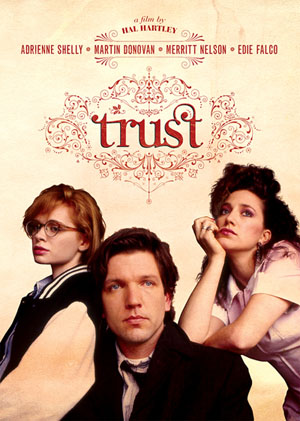The staff at PopMatters has just written up their top 40 DVDs and Blu-rays of 2012. And remember the 2012 DVD Beaver poll? Jonathan Rosenbaum‘s posted his full ballot.
Hal Hartley‘s second feature, Trust (1990), now out from Olive Films, “has aged gracefully,” writes Howard Hampton for Artforum. “Its left-handed ambiguities, quizzical juxtapositions, wryly twisted symmetries, blank wit, askance plotting, pungently sketchy characters, and subversive understatement have taken on the stature of a recondite landmark. The iconic performances of Martin Donovan and the late, profoundly missed Adrienne Shelly feel like Long Island’s flatly blue-collar answer to Belmondo and Karina: a half-cocked, mixed-motive duo that bond over abusive parents, mutual despair, word definitions, a parched thirst for knowledge, and a hand grenade. Their sputtering, circuitous, stop-motion chemistry culminates in just about the most oddly romantic denouement of late-twentieth-century cinema—a low-key, high-stakes burst of seriocomic transcendence.”
More from Chris Cabin in Slant: “Like the romance that blooms between Donovan’s disillusioned thirtysomething and Shelly’s reformed teen-bopper, the film is strange in its very design, favoring a stunning use of imagistic symbolism over familiar dramatic lather; a Cape Holiday bumper sticker, Matthew’s heirloom grenade, and Maria’s spilled chicken soup are just as cathartic and revealing as anything they say to one another, if not more. If the story seems equally derivative of Hal Ashby and John Hughes, the tone and atmosphere of the film summons recollections of Bresson, and Godard‘s more profound flirtations with familiarity, particularly Every Man for Himself.”
For the Los Angeles Times, Dennis Lim reviews in the new Cinema Guild release, Sokurov: Early Masterworks: “Save and Protect (1990), inspired by Madame Bovary, is the most straightforward film here… Sokurov‘s insistence on the fundamental differences between literature and cinema means that his adaptations do not attempt in any conventional sense to transfer actions and thoughts from page to screen. If anything, they are more likely to evoke the relationship that a rapt, transported reader has with a particular book or author…. Stone (1992) is a black-and-white chamber piece, shot mainly in Anton Chekhov’s mansion in Yalta (now a museum), where a young caretaker talks to and tends to an old man who is presumably the ghost of the writer. Little happens, but the spectral atmosphere, prone to slippage and reverie, is gripping…. Whispering Pages (1994), included in Blu-ray and standard-definition versions, is one of Sokurov’s supreme achievements. The opening credits nod to ‘works of 19th-century Russian literature’ without naming them, but there are obvious echoes of Dostoevsky’s Crime and Punishment, with a Raskolnikov character wandering the catacombs and caverns of a city by the water. This is Sokurov’s first sustained immersion in what would become his trademark environment: a dream world of permanent dusk.”
“It’s a sign of Penny Woolcock’s astonishing work rate that she premiered not one, but two new films at last year’s Sheffield Doc/Fest. From the Sea to the Land Beyond, her account of Britain’s coastline as seen through over a century of documentary film, stole the headlines and understandably so.” Anthony Nield presents an overview of the work of one of “the UK’s most prolific filmmakers” at the Quietus. From the Sea is now out from the BFI, which ran a piece on Woolcock last summer by Nick Bradshaw.
For more on recent releases, see Sean Axmaker (MSN) and Alonso Duralde (Movies.com).
CRITERION
Christopher Nolan has notes on his top nine Criterion releases, plus one more for the wish list.
Ron Deutsch: “I hate to admit it, but as much as I enjoy watching Elevator to the Gallows, I think I’d be just as happy if everything were cut out of it except for Jeanne Moreau wandering the Champs-Élysées at night, accompanied by Miles Davis’s elegiac soundtrack.”
Alfred Hitchcock’s The Man Who Knew Too Much (1934) is now out “in a magnificent restoration from the British Film Institute,” notes Dave Kehr in the New York Times. “Often cited as the first of Hitchcock’s globe-trotting spy thrillers, a format he would revisit periodically for decades to come, it is also part of a less-noticed cycle within Hitchcock’s work: films centered on marriages and the careful negotiations necessary to ensure their survival. It was a theme that Hitchcock explored in a range of tones and with varying degrees of optimism, from Rich and Strange (1931) through Marnie (1964).”
Rich and Strange was actually one of “two recent, major flops” for Hitch, notes Farran Smith Nehme in the essay that accompanies Criterion’s release. The other, Waltzes from Vienna, was “a musical about Johann Strauss the Younger, of all things, that he rashly took on during a jobless period in 1933. ‘Melodrama,’ he said, ‘is the only thing I can do.’ And sure enough, his next film was a melodrama, the brilliantly constructed tale of an unexceptional British couple who run into exceptional trouble on holiday. The Man Who Knew Too Much (1934) was also Hitchcock back in form, with even more dazzle, economy, and humor—and with the great Peter Lorre demonstrating definitively how a Hitchcock heavy should be played: with a light touch.” And she’s got a Lorre anecdote back at her place. More on the first Man Who Knew Too Much from Josef Braun, Bill Ryan, and the AV Club‘s Scott Tobias.
For news and tips throughout the day every day, follow @KeyframeDaily on Twitter and/or the RSS feed. Get Keyframe Daily in your inbox by signing in at fandor.com/daily.




